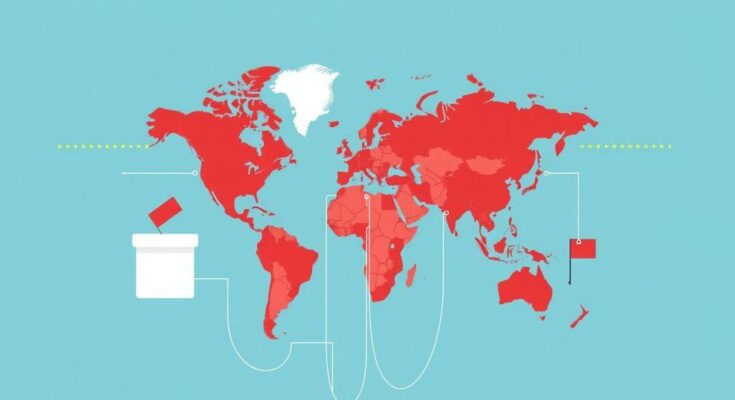In 2024, over 70 national elections occurred, impacting more than half of the world’s population with a notable trend: incumbents faced significant vote share declines across countries, signaling widespread anti-incumbent sentiment. This pattern affected both left and right-wing parties in various democracies, demonstrating a growing public discontent with the status quo and electoral engagement challenges globally.
The year 2024 was monumental in the realm of global elections, with over 70 nations, representing more than half of the world’s populace, participating in significant electoral processes. Major democracies such as India, the United States, and Indonesia, along with 27 European Union member states, contributed to this surge in democratic engagement. According to the International Institute for Democracy and Electoral Assistance (International IDEA), the elections generated more than 1.6 billion ballots cast.
One notable trend observed throughout these elections was a substantial decline in support for incumbent parties. The Financial Times reported that all incumbent parties in developed nations faced a drop in voter share for the first time in nearly 120 years, as documented by the ParlGov database. This shift was not limited to developed nations; an analysis by ABC News’ 538 found that over 80% of democracies, whether affluent or impoverished, experienced losses either in seat count or overall vote percentage for incumbent parties.
The election cycle favored both conservative and liberal parties, capitalizing on the prevailing anti-incumbent sentiment. Noteworthy conservative victories occurred in battleground states of the United States, where former President Donald Trump triumphed, and in Portugal with the center-right Democratic Alliance gaining significant ground. Conversely, the left also claimed victories in countries such as Britain and South Korea, where incumbent parties suffered substantial declines in voter support.
While some dominant parties retained power, many witnessed a contraction in their legislative majorities. For example, India’s ruling Bharatiya Janata Party, led by Prime Minister Narendra Modi, lost its outright parliamentary majority yet remained in authority through coalition-building. Similar trends were noted in several other countries, including Japan, South Africa, and France, where incumbents experienced reduced support while securing reelection.
The situation was markedly different in less democratic nations, where governments often exert significant control over the electoral process. In Rwanda, President Paul Kagame achieved an overwhelming victory, and in Russia, President Vladimir Putin’s victory was widely criticized for lacking democratic validity. However, even in these contexts, some signs of discontent emerged, such as in Bangladesh, where Prime Minister Sheikh Hasina faced a narrower victory margin, and in Iran, where a more moderate candidate was elected to replace the hardliner president.
Analysts attribute the incumbents’ electoral losses to widespread public discontent regarding global economic challenges, including rising living costs. Notably, Mexico stood out as an exception with the electoral success of Claudia Sheinbaum, indicating positive public sentiment towards economic conditions. The year also highlighted an increasing voter dissatisfaction with democracy itself, as evidenced by a Pew Research Center survey indicating a general sentiment of alienation towards elected officials.
As the global community transitions into 2025, with a less pronounced electoral schedule featuring upcoming elections in nations such as Argentina, Australia, Canada, and Japan, anticipation mounts regarding whether the trend of anti-incumbent sentiment will persist or if new dynamics will reshape political landscapes.
The global elections in 2024 showcased a significant shift in voter behavior, with widespread anti-incumbent sentiment affecting parties across diverse political spectra. This electoral landscape is characterized by rising dissatisfaction with established parties, driven primarily by economic concerns, electoral integrity, and public perception of representation. The massive turnout and diverse electoral outcomes demonstrate the evolving nature of democratic engagement worldwide, reflecting larger trends of populism and public discontent with traditional governance.
The 2024 global elections have epitomized a turning point for incumbents worldwide, underscoring a pervasive anti-incumbent wave characterized by significant losses across both rich and poor democracies. Factors driving this shift include economic dissatisfaction, a yearning for change, and disillusionment with democratic systems. As countries prepare for upcoming elections in 2025, the continuation of this trend will be closely monitored, as it may herald a reconfiguration of political landscapes around the globe.
Original Source: www.voanews.com




